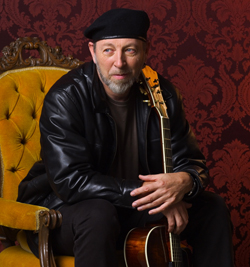Search
Rychard Carrington reports on Richard Thompson - Cambridge Corn Exchange, 16 January 2009

It is surely testimony to Richard Thompson’s greatness that he is most celebrated for his talents as a songwriter and as an electric guitarist, yet for this show he neither played electric guitar nor performed any of his own songs. Thompson has explained the derivation of the show, entitled 1000 Years Of Popular Music, which he has performed periodically, with set changes, throughout the current millennium:
‘The idea for this project came from Playboy magazine - I was asked by submit a list, in late 1999, of the ten greatest songs of the millennium. Hah! I thought, hypocrites - they don't mean millennium, they mean twenty years - I'll call their bluff and do a real thousand-year selection. That they failed to print my list among others submitted by rock's luminaries, is but a slight wound - it gave me the idea for this show…. The idea is that popular music comes in many forms, through many ages, and as older forms get superseded, sometimes the baby is thrown out with the bathwater - great ideas, tunes, rhythms, styles, get left in the dust of history, so let's have a look at what's back there, and see if still does the trick.’
A laudable concept surely, and, of course, it is executed with Thompson’s customary calm intelligence and inventive good taste. His acoustic guitar and vocals are ably abetted by Debra Dobkin’s percussion and backing vocals and Judith Owen’s lead vocals and piano. Owen contributes outstandingly, clearly an interesting and very talented performer in her own right.
The first half of the show takes us from the twelfth century through to the end of the nineteenth. After some interesting medieval and renaissance numbers, we get When I Am Laid In Earth (opera by Purcell), Remember, O Thou Man (hymn), Shenandoah (American sea shanty), The Blackleg Miner (Newcastle folk), I Live In Trafalgar Square (music hall), Down By The Salley Gardens (Irish traditional tune, lyrics by W.B. Yeats) and A Man Who Would Woo A Fair Maid (Gilbert and Sullivan). An interval before the twentieth century, then Java Jive (The Ink Spots), Night And Day (Cole Porter), Drinking Wine Spo-De-O-Dee (Jerry Lee Lewis), All Right (I'll Sign the Papers) (50s honky-tonk), See My Friend (The Kinks), Friday On My Mind (The Easybeats), Money, Money, Money (Abba), Everybody's Got To Learn Sometime (The Korgis), and finally Maneater (Nelly Furtardo), with its middle section translated into Latin and performed in the style of twelfth-century church music. The songs are introduced with easy humour, and are complemented by an interesting selection of pictures on back projection. Every song worked thoroughly well.
There’s an interesting contrariness in Thompson, in that he has such an introverted manner, such a feel for depth and darkness, yet so many of his songs celebrate the thrills and spills of common revelry on a Friday or Saturday night. He has a loving understandsing of the soul of pop: not a sniggering affection for kitsch, but a keen appreciation of the sentiments that move the masses. His masterful playing and sensitive singing possess a solemnity which never detracts from but deepens the raw pleasure of hearty, unpretentious music. He can bring out the pathos, the yearning, in seemingly the most frivolous of songs. This was especially evident tonight in Money, Money, Money, which he made sound like one of his own compositions.
Next time Thompson cones to town, expect the show to be totally different, but do expect it to be outstandingly good.
Writer: Rychard Carrington